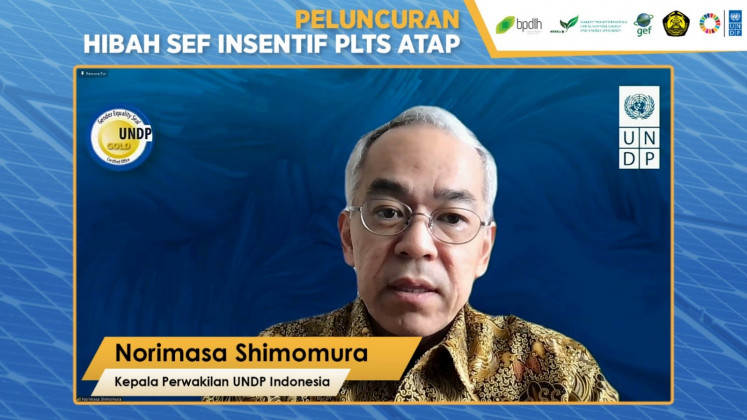Popular Reads
Top Results
Can't find what you're looking for?
View all search resultsPopular Reads
Top Results
Can't find what you're looking for?
View all search resultsGovt launches SEF grant, hopes to boost widespread adoption of rooftop solar power grids
Change text size
Gift Premium Articles
to Anyone
T
he Energy and Mineral Resources Ministry, in collaboration with the United Nations Development Program (UNDP) Indonesia, has launched the Sustainable Energy Fund (SEF) grant aimed at rooftop solar power grid (PLTS atap) incentives.
Part of the Market Transformation for Renewable Energy and Energy Efficiency through Design and Implementation of Appropriate Mitigation Actions in Energy Sector (MTRE3) project and supported by the Finance Ministry, the incentive uses the SEF grant allocation from the Global Environment Facility (GEF) and will be managed and distributed by the Indonesian Environmental Estate Fund (BPDLH).
This incentive aims to encourage more PLN customers to install rooftop solar power grids, especially households, businesses and MSMEs, as well as social institutions such as schools, hospitals and places of worship.
In turn, the program is expected to accelerate the massive implementation of the rooftop solar power grid implementation program and contribute to the achievement of new and renewable energy targets in the national energy mix.
In his opening remarks, Energy and Mineral Resources Minister Arifin Tasrif said the existence of financing innovations would increase investor and public interest in the use of solar energy.
"This incentive is expected to achieve the economic value of rooftop solar power grids by making the investment more attractive, in turn encouraging massive installation and contributing to the achievement of new and renewable energy targets and greenhouse gas (GHG) emission reductions," he explained.
The existence of the rooftop solar power grid incentives, Arifin continued, was able to stimulate new funding innovations from the banking sector and other financing institutions, cooperation institutions, as well as donors.
"Hopefully this will make it easier for people wishing to invest. Thank you in particular to the UNDP for continuously supporting the implementation of new and renewable energy in Indonesia.”
In order to attract public interest in rooftop solar power grids, the government has made several changes to the regulations through Energy and Mineral Resources Ministerial Regulation No. 26/2021.
Some of the changes in the regulation include the increase of KWh electricity export provisions from 65 to 100 percent, a shorter application period for rooftop solar power grids, a dedicated complaint center, along with opening up opportunities for carbon trading from rooftop solar power grids.
Arifin noted that the development of rooftop solar power grids would make a positive impact on the community, including the absorption of more than 120,000 workers, and an increase in investments of around Rp 50 trillion.
Simultaneously, the development will also encourage the growth and development of domestic solar power grid supporting industries, encourage green products in the service sector and green industry so as to avoid carbon border taxes at the global level, and reduce carbon emissions by 4.5 million CO2-eq.
Financing and risk management director general Luky Alfirman said the grant was a financing model to design and implement the appropriate climate change mitigation actions in the energy sector.
"It is hoped that the SEF can answer the needs of off-grid as well as small and medium-scale new and renewable projects. This financing support comes in the form of loan guarantees, project financing, as well as validity funds," Luky said.
Meanwhile, UNDP Indonesia resident representative Norimasa Shimomura expressed his appreciation to the government for the trust given to the UNDP in achieving the sustainable development goals (SDGs), especially in clean energy and climate change.
"This incentive program is an example of a green recovery strategy as it focuses on small and medium enterprises, medium-sized homes and the social sector. Incentive support is provided to encourage green investment, which will stimulate economic activity, create jobs, as well as reduce electricity costs and greenhouse gas emissions,” said Shimomura.
Also attending the launch is new, renewable energy and energy conservation (EBTKE) director general Dadan Kusdiana, and UNDP Indonesia’s senior advisor for sustainable energy Verania Andria. Both expressed their hope that the grant could attract more consumers by providing relief on the investment costs of rooftop solar power grids to achieve its economic value and encourage widespread adoption.
"By involving national financing institutions such as the BPDLH, it is hoped that there will be a continuation or replication of the program after this collaboration with the UNDP ends," Dadan added.
Incentive Application Requirements
The incentive will be given on a performance-based payment mechanism using an e-voucher, where the applicant must pass the verification stage. If the application is approved, the incentive payment is made in full according to the value of the e-voucher via bank transfer to the applicant's account.
To be eligible, the applicant should be a PLN customer who will be or is in the process of installing a rooftop solar power grid and has not yet installed net-metering as of Dec. 1, 2021. Then, the applicant is required to include information regarding the citizenship identification number (NIK) or business identification number (NIB), where one NIK or NIB can only submit one application for each customer category.
At the same time, the contract with the business entity or contractor for the rooftop solar power grids must be registered in the berizin berusaha (licensed business) category at the Energy and Mineral Resources Ministry. The applicant is required to show proof of PLN approval, NIK/NIB information, customer bank account number, Letter of Operation Eligibility (SLO) or documents from the manufacturer, Statement of Completion of Installation and Payment issued by the business entity or contractor, and a photo of the installed power grid with GPS coordinate information. Rooftop solar power grids purchased through an installment scheme must include proof of transfer to the lender.
The incentive program does not apply to rooftop solar power grids financed from government funding sources or through donors.









